While world leaders were discussing MDG progress at the UN global summit last month, I got my first opportunity to see reality in Zimbabwean primary schools.
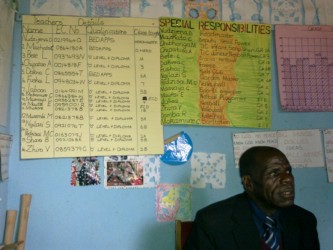
As part of a joint monitoring mission with government officials, UNICEF and other partners, I visited schools in Chitungwiza (an urban settlement on the edge of Harare) and the rural areas of Mashonaland East and Masvingo province.
Given the recent economic meltdown, violence and mass migration I wasn't sure what to expect. I was pleasantly surprised to observe how functional at least eight of the schools I visited were. Children were packing classrooms and working hard at lessons. The 'top class' was working particuarly hard in advance of next months grade seven exams. The dedication and skill of the school staff and teachers was evident. Despite many challenges (not least low salaries) learning was taking place.
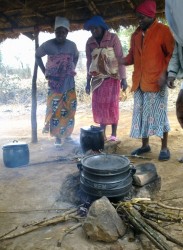
Talking to headteachers and teachers presented a more nuanced situation than is observed at first glance. Many buildings are deteriorating, there is an absence of textbooks (most classes had so few that teachers were copying lessons via the blackboard) and de-motivated teachers are struggling to make ends meet.
Further from Harare the signs of poverty become more evident, in particular at schools like Sikata Primary, Masvingo. Which we visited on an unusually cold wet morning near the impressive stone fortress of Great Zimbabwe. The headmaster Mr Vudzijena eloquently outlined the school's achievements; a new playground and school vegetable garden provided with parental support.
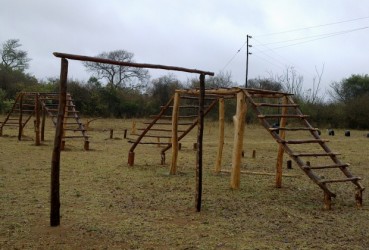
However he also showed us worrying drops in the grade seven primary exam results. The two grade one classes were sharing a run down classroom and half the children had to sit on a crumbling concrete floor, waiting their turn to use the desks for writing practice. The teachers had done a great job with mobiles, empty coke cans and a nature corner to brighten up the rooms, but the need for cash to improve the school was evident.
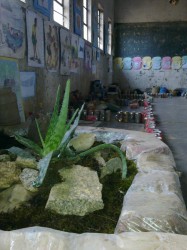
Poverty and HIV are two vast interconnected problems that contribute to the situation. Thankfully HIV and AIDS prevalence rates have dropped from their high point (around one in five adults early last decade), but the legacy is stark. Nearly 80% of children at Sikata school were classified as OVC. This acronym – Orphans and Vulnerable Children - is shorthand for human tragedy; kids who have lost one or both parents (many to AIDS) or live in a home without a breadwinner (e.g. sick parent or cared for by a grandparent or sibling).
At Kufonya primary school the 'OVC stats' on the wall of the school office starkly quantified that 35 children had both parents deceased, while 149 had lost one parent. In total 198, over half the children, were regarded as an OVC and therefore eligible for BEAM (Basic Education Assistance Module) support.
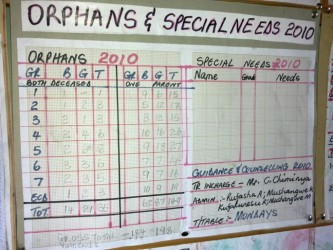
BEAM was introduced by the Zimbabwean government around a decade ago to offset school costs for OVCs, but stalled in the era of hyper-inflation when the Zimbabwe dollar became worthless. This year around half a million primary school children are now benefiting once more from BEAM. Donors (including the UK) have channeled $10 million in funding through UNICEF, who has been helping deliver the programme. The funding is providing much needed cash to cover levies. The schools pictured were receiving around $660 per term to cover costs and buy vital equipment.
The financial meltdown has resulted in most rural schools being reliant on parental contribution for the upkeep of the school – a system of school fees and levies. By western levels these are low in rural schools, $5 – 10 per child per term, but these are still unaffordable to many and contribute to children dropping out of school. At Kufonya primary school the head teacher's efficient record-keeping informed us that only around one-third of the children classified as OVCs received the BEAM payments and the other 120 children still had to pay levies, despite having almost no means to do so. The community themselves had to strike a balance and select the BEAM 'winners and losers' in a divisive selection process to rank the extent of poverty and need.
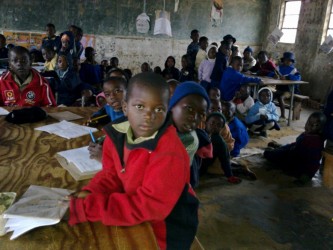
I certainly hope that it will prove possible to eliminate these compulsory school costs for the poor, or better yet, all children in Zimbabwe. Other African countries have managed to do so and this has contributed to surges in enrolment. However there is also a need to balance the resources schools need to operate. Without rooms, books and teachers the schools cannot function and some hard policy choices must be made before fees and levies are abolished. A balancing act just as tricky as any Olympic gymnast's manoeuvres on a narrow beam.

4 comments
Comment by Andrew Herriot posted on
Ian
Very interesting. Since 1975 I have been involved in three major African projects (Lesotho, BANFES, USAID), (Zambia, AIEMS, ODA), (Kenya, PRISM, DFID) and what you describe is more or less what I observed over the years, the difference being the countries had not experienced violence and a monetary meltdown but an emerging AIDS/HIV epidemic. AID was pumped into the various systems to make it better. What is really interesting is that the World Bank will be supporting a Basic Education project in Lesotho this coming year (classrooms, reception class support and capacity building for teachers) some thirty years after Basic Education and Non Formal Education. The common thread throughout these years was the dedication of the teachers, the community and parents and the commitment from pupils and learners. Making the best and honest use of resources, human - especially leaders and financial, is the key and giving the schools and their teachers much needed ownership and pride.
I am now in South Africa and looking forward to visiting some schools. I expect I will find something similar. I look forward to more blogs.
Comment by michael westcott posted on
Would it be possible for affluent schools in South Africa to adopt a Zimbabwean school to assist it with books, infrastucture, learning tools etc. Perhaps one could start a face book group to get it up and running? This could form a part of the life skills teaching in the curriculum. i think we do it amongst some S.A schools so perhaps we could extend that to our northern neighbour.
Comment by Ian Attfield posted on
Andrew, Michael.
Both very perspective comments, although I would add Zimbabwe has also suffered from a widespread AIDS epidemic which thankfully is now seeing lower inidence rates that should reduce the numbers of orphans needing support.
Linking schools between countries is a very useful initiaitive I have seen operational elsewhere, not least the World Links and partnerships scheme: http://www.britishcouncil.org/schoolpartnerships.htm IT can greaty facilitate such exchanges, although Internet access is still constrained and expensive in Zimbabwe at present.
Comment by Adamu Salifu posted on
I have read about children who need our support and encouragement.in many ways. I am in the teaching field for long. And l dedicated myself as an African educator and teacher l love to give off my best to pre - schools that need a devoted personnel to assist the poor children both in reading and writing. It is said that ,said is not easier than done.
l have the capacity as a teacher to build these poor children to become the best ones. So let us join hands in hands ,in order to make poor children hail while the sun shines.